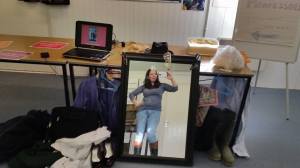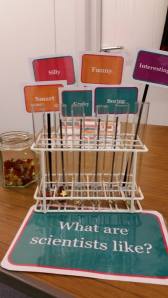Our wonderful and talented communications officer, Sarah, has been working hard to promote the image of women in the STEM fields. We’ve been going round schools and encouraging people to ask us about our Women In Science posters at all of our events, and at our Barony College open day she really outdid herself with our ‘Women in STEM’ fields stall. We had a ‘dress the scientist’ event, which was a huge amount of fun, two jars of couscous (well, one jar, one bucket) representing the difference in the numbers of female and male professors in the UK, and a ‘vote’ on what words accurately described scientists.

The irony is, I’d recently applied for a communication job myself (working with the STEM fields but out of research), and I’d been tempted by another industry R & D job. While this economic climate makes applying for jobs an exercise in cover letter writing days, it’s not entirely outside the realms of possibility that I might leak from the STEM pipeline.
So while I had lots of little girls announcing they wanted to put a labcoat in the dressing up box alongside their princess outfits (I particularly loved the girls who picked up my high heels and paired that with the labcoat to be a ‘fashion scientist‘) I was also answering the questions from the mums and dads: why do women leave STEM?
I can’t speak for all women, but I can tell you what tempts me to apply for these other jobs:
- Money. I have a good wage right now, and postdocs are paid well in general, but industry pays us really well. Now I did apply for a communications job a few years ago where they said I was asking for too much money, but that was more of an indication to me about the way they treated their employees. STEM graduates are worth paying for, even in this economic climate, and what’s more, that money often comes with a permanent contract . . .
- Permanency. I’ve no real right to complain about this as I have been very lucky. My bosses have kept me around and that wasn’t easy. But I think this one is particularly hard for the women who have never left academia. We’ve thought our entire lives in 2, 3, 4 year blocks of time, and there’s no sign of that changing any time soon.
- Skills. I think I’m really good at science communication. I love doing it. A science communication job would be really enjoyable. I’ve developed a lot of skills in STEM, and some of them I want to make more use of.
- Opportunity. This might be more specific to the animal welfare field, but there is so little funding and so many research ideas that it feels like I’d have more luck trying to get funding from a raffle prize sometimes. It would be nice not to have to fight every single day.
- Values. In the last few years I have realised my core values can be satisfied without world domination – I mean I would still like to dominate the world, but in the every day, there are other things I enjoy doing. Perhaps, whisper it, my career isn’t the most important thing in my life any more.
- Satisfaction. What, recently, has given me the most satisfaction in my work? Is it the constant criticism and destruction of the scientific process?
Of course there is also a multitude of reasons for loving my work in the STEM fields, and I don’t expect I’ll be leaving any time soon, but it’s important to recognise that women don’t leave STEM to have babies. Academia is, in many ways, a friendly environment for that. We leave for a whole host of reasons.
What did the kids and parents think about scientists? Well, we were most often described with the words smart and silly, with interesting following along behind. Great news I think – science is fun, and I really hope girls and boys can recognise that.
